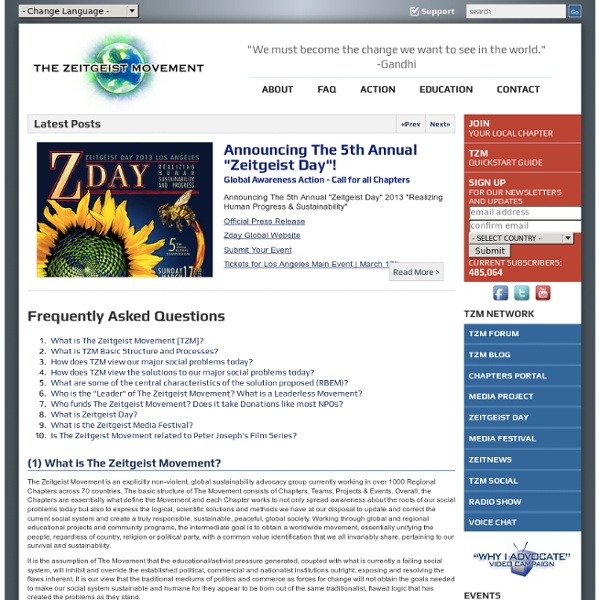TZM - Orientation
Download Here The Zeitgeist Movement Defined (Full PDF Book) Who profits? Financial Data to see financial transparency info. About: The Zeitgeist Movement Defined is the official, representative text of the global, non-profit sustainability advocacy organization known as The Zeitgeist Movement (TZM). This tediously sourced and highly detailed work argues for a large-scale change in human culture, specifically in the context of economic practice. However, in the early 21st century, these problems have risen prominently, taking the consequential form of increasing social destabilization and ongoing environmental collapse. While largely misunderstood as being "utopian" or fantasy, this text walks through, step by step, the train of thought and technical industrial reordering needed to update our global society (and its values) to enable these profound new possibilities. If you find a Typo, please email media@thezeitgeistmovement.com (1) Preface Document Structure The Organism of Knowledge About
Zeitgeist Information
Dealing with the Overpopulation Myth
To start off, as long as the market system is in place and profit is the main motivation to do anything, what I talk about won't happen (social entrepreneurs, fortunately, aren't profit-motivated, but that's a different discussion). However, assuming the infrastructure is in place to meet everyone's essential needs (food, water, shelter, healthcare) and essential luxuries (transportation, energy, education, communication), the population would cease to increase and may even begin to decrease [1] (nations with lower levels of poverty have fertility rates at or below replacement levels, while nations with greater levels of poverty have fertility rates well above replacement rates, strongly suggesting that guaranteeing everyone's basic needs would stop, or reverse, population growth). Furthermore, a report by the United Nations [2] predicts the global population rising to, at most, 10.6 billion by 2050 (a worst-case scenario, essentially). Education is easier.
"Who Are You Protecting?"
Freedom of Speech, freedom of assembly, and freedom of the press. These legal rights, guaranteed to United States citizens by the first amendment, are essential to our free democracy. It has allowed for several national revolutions, such as movements for black and female suffrage, to change public opinion and national tradition. Protests have been at the heart of American democracy since its creation, but recent action by the NYPD and other local police departments around the nation have been infringing upon the protestors’ constitutional rights, arresting and brutalizing them with disregard to their grievances. Arrests related to Occupy Wall Street since it began on September 17th have reached 4,400 on November 17th, arresting more protestors in a two month period than the Iraqi government had arrested throughout the country’s uprising in 2009 (Quinnell). Members of credentialed press were also arrested during a police raid of the occupy camp in the early hours of November 15th.
The Zeitgeist Movement Global Site



